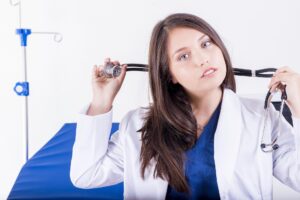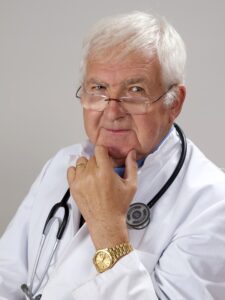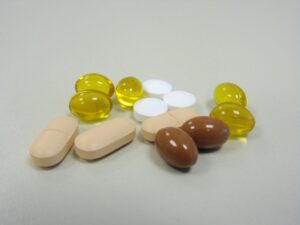
No One Can Ever Find a Doctor
One of our Readers in Hartlepool, England wrote to us with this comment:
On your site keep saying to go see your doctor, to go ask your physician, to be sure to check with your health care provider, and so on. That’s wrong! Most of us don’t have a doctor we can just go see, or that we can just ask. It takes weeks or months to get an appointment. Sometimes there’s no doctor to see no matter how long you wait. There’s no “answer your question” phone line to a real doctor. If you’re sick now and need help now you’re out of luck almost everywhere in the world. Unless you’re so sick, so near death, that the UEC [Urgent and Emergency Care] in some hospital will see you. That might work if you live in a country that has hospitals with emergency care.
Yes, it’s true, this reader correctly states the case. While there was this idea of one’s personal physician or treating physician, it usually was more for the few who could afford such personalized care. Now, with huge public health systems, the fantasy of seeing your own doctor still lingers but, especially when you’re just “kind of sick”, there’s no doctor to be found. Some people are lucky to have an identified physician for a chronic medical problem, but if you’re healthy and suddenly fall ill, it’s hard to find care. With the situation of too few fully trained physicians there has developed a proliferation of nurse practitioners and physician’s assistants to try to meet people’s needs. Given the reality that our reader brought this to our attention, we thought we’d spend a few paragraphs describing what people actually do to get help when there is no one to help.

Are You Crazy – There Are No Doctors To Just “Go See”
We have to admit that we’ve fallen into the common jargon of “your physician”, “your personal doctor”, and similar terms as though you have a medical person who knows you that you can just go see as needed. For many, many people it might be more realistic to say go to your nearest urgent care clinic, or to call a nurse hot line if there is one. But good quality free nurse help lines are also rare. And going to an urgent care clinic can cost a fortune even if one has reasonable health insurance. And, an urgent care “visit” is going to take hours and hours of your time. Hours that someone working a job and now sick often does not have. And hospital emergency departments? Forget it. They’re so expensive and time consuming they make urgent care clinics look quick and cheap. So, what to do?
Welcome to the Neuroscience Research and Development Consultancy website. Have a question or a comment? Send it to us at: Comment@NeuroSciRandD.com
When There Is No Personal Physician to Just Go See
What people actually do when they fall ill is try to access what information they can and do the best they can. Many go onto the Internet with Google searches and YouTube videos to diagnose themselves and find a treatment. This practice is hard to criticize if there’s no other help, but it’s a risky path to take. There’s more false information, really bad, dangerous false information, on the world wide web than good medical information. There are, of course, many reputable sites, but they usually say what they might do if you came to see them for care. They rarely tell you what to do to diagnose and treat yourself. And the sites that do come right out and tell you how to diagnose and treat yourself are most often the disreputable sites that will steer you in the wrong direction.
Your Friend as Your Doctor
Another path that is often chosen as a reasonable way to go is to talk to a few close friends about your problem and see what they think. Perhaps they had the same elbow pain last year or had the same flu bug last month. What worked and didn’t work for them? Depending on the situation they might even have some left over medication that they’ll give you to take. Now ask any physician, any nurse practitioner, any physician’s assistant, any health care provider about this idea and they’ll tell you it’s a horrible way to go, fraught with danger. This is true. But is it more dangerous than being sick and doing nothing. Well, maybe. But nonetheless it’s what many people do when they get sick and can’t get care.
Your Neighbor as Your Doctor
This access route to help is similar to consulting your friends as though they were physicians, except that neighbors are closer, as least distance-wise closer. If you’ve fallen and hoping someone will notice that you’ve not come outside in a while, it’s one of your neighbors who might rescue you, or who might call social services for a wellness check on you. The hope here is that one of your neighbors is, if not a real friend, at least friendly enough to help. Another hope is that someone is nosey enough to kind of keep track of people in the neighborhood, the patterns of coming and going, in case something is out of place. And just as with friends as doctors, with your neighbor, ask some advice, borrow some medication, incur the distain of all the real health care providers, and hope you live through it.
There Are Those Who Don’t Trust Doctors Anyway
We’ve again approached this situation from a narrow point of view. There are people, and if the pandemic is any indication, there are many, many people, who don’t even want to see a doctor because they don’t trust doctors. They are right in the groove of friend as their physician, neighbor as their physician, “best-buddy healer” person as their doctor. The list of neighborhood helper people is long with lots of titles, such as faith healers, some but not all acupuncturists, astrologers, some but not all chiropractors, fortune tellers, homeopathic “doctors”, witches, or sorcerers. While most would view these individuals as charlatans, there are many who seek them out as the most trustworthy source. They might incur the rath, not only of all the real health care providers but of everyone else who doesn’t believe. We can’t offer any advice here. We just hope they live.

Rule to Follow in Borrowing a Medication
Part of the journey through having a friend or neighbor or non-traditional healer as your doctor is getting a medication for your illness. This particular aspect is of especial concern because, while bad advice can cause you trouble, bad medicine can kill you. Ethical pharmaceuticals at least actually have in the pill what it says on the bottle. This is not true for most “natural” medicines or herbal remedies. An exception is that for brands that display a “USP Verified Mark”, what’s on the label is what’s in the bottle. One fortunate circumstance is that most “natural” medicines or herbal remedies, though ineffective, are harmless. The biggest risk category is drugs made to look exactly like a pharmaceutical medication but that are fake, made by the drug cartels and backroom chemists. The paragraph below addresses this aspect of staying alive when your friend is your doctor.
Only From a Pharmacy in the Country Where You Live
The nightly national news and the Internet are filled with regular stories of a teenage who took “Valium” to calm down, and died. The name of the real medication does not matter. Many ethical pharmaceutical medications have been knocked-off by backroom chemists and drug cartels. Here’s the problem. Even if these amateurs could make the actual medication, which they usually can’t, it’s harder to make and more expensive to make than fentanyl. A plain old aspirin has 325 mg of aspirin in it. For fentanyl, 325 mg could kill 81 people. Fentanyl is a factor in 53% of overdose deaths, 42,700 deaths in 2020. So if you’re borrowing your friend’s medication, only take it if it’s in a real pharmacy or pharmaceutical company container and if it came from a pharmacy in the country in which you live. Otherwise you might wind up treating your headache by killing yourself.
Not Too Far Out of Date
This is an often asked question. I can’t sleep at night and my neighbor lent me some of his doxepin to take at bedtime, but the label says it expired two months ago. Is it safe to take? Yes, probably. This whole “out-of-date” concern has been blown way out of proportion. Consult The Medical Letter on Drugs and Therapeutics, Vol. 62 Issue 1603, July 27, 2020, pp. 117-119. The Medical Letter says that when no suitable alternative is available, outdated drugs may be effective. “Many solid dosage formulations stored under reasonable conditions in their original unopened containers retain ≥90% of their potency for at least 5 years after the expiration date on the label, and sometimes much longer. Solutions and suspensions are generally less stable. There are no published reports of toxicity from degradation products of currently available drugs.” So, the expiration date is not the biggest problem.

Absolutely No Street Drugs
This is part of the topic of avoiding fake drugs except that these are super-fake drugs often offered as safe. Don’t do it, don’t trust it. It’s one thing to “borrow” a pharmacy-bottled pharmaceutical medication from your friend or a neighbor. It quite different to buy something from the guy on the corner. The chance of getting something safe and effective from the drug dealer on the corner is near zero. We don’t like to preach, but in this case, just don’t do it.
Reference:
Drugs Past Their Expiration Date. The Medical Letter on Drugs and Therapeutics, Vol. 62 Issue 1603, July 27, 2020, pp. 117-119
Helpful links:
Harvard Medical School’s Harvard Health on Supplements: A Scorecard
National Center for Complementary and Integrative Health on Using Dietary Supplements Wisely
The British Medical Journal on Health Effects of Vitamin and Mineral Supplements
